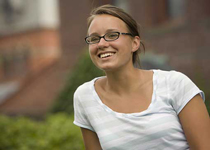WORTH SUPPORTING
Debbie '80 and Andy Rachleff open doors for talented students
Debbie Rachleff '80 knows that plenty of talented students need help to afford a school like Cornell, and she wants to give it.
Rachleff and her husband, Andy, recently made their most significant gift to date -- $250,000 to a scholarship fund they set up eight years ago in memory of Debbie Rachleff's mother, Bess Davidoff, who died when Rachleff was a teen.

Debbie '80 and Andy Rachleff
"We are very fortunate to be in our situation," she says. "We see so many of our friends and our kids' friends who have incredible opportunities to go to schools like Cornell, but we see other kids who are struggling.
"My interest is making sure that the option of a top-flight school is available to everyone who qualifies, not just to privileged kids."
Rachleff knows something about that, having stayed afloat during her own undergraduate years by tending bar every weekend at the Royal Palm Tavern in Collegetown.
"It was a real townie bar, and one of the most enjoyable experiences of my life," she says. "We would cash everybody's paycheck on Friday, and the tips were huge. I was very lucky. It was my food and my rent and my spending money."
Rachleff studied social work and psychology in the College of Human Ecology and is now a full-time mother of a 16-year-old daughter and a 14-year-old son. Andy Rachleff is a retired venture capitalist who teaches at the Stanford Graduate School of Business.
The family has given steadily to their fund at Cornell, and they have taken pleasure in watching the awards it generates grow larger with time. They are touched by the occasional notes of gratitude sent by recipients of their scholarship, Debbie Rachleff says.
"These students have enough to do, so it's certainly not necessary but it's very touching," she says. "I show them to my kids in the hope that it will inspire them to do charitable things to affect others' lives. We hope it will teach them multiple layers of giving. When you are thankful for what you have, you're thankful for what you can give."
Endowments invest in talent from all over
Rewind the clock five years and you will find Bethany Ojalehto in her senior year of high school in Monroe, Wash., a town outside Seattle, as she faces an uncertain future.
She is a talented distance runner at the top of her class. But college is only a possibility. Her father is a carpenter and works in construction, and her mother splits her time between secretarial work and caring for seven children, so there is no money for college.
"I had a wonderful childhood, and my parents taught us that money is immaterial to happiness," Ojalehto says. "It's an unfortunate feature of American society that money is not immaterial to a child's higher education."

Bethany Ojalehto '08 See larger image
Things changed when Cornell cross country and track coach Artie Smith flew her to Cornell for a recruiting visit. "Cornell really encouraged me that financially they could make it happen," she says.
With that prodding, she completed her first and only application for college.
Fast forward to today. Ojalehto is a Class of 2008 graduate living among Sudanese, Somali and Ethiopian refugees at the Kakuma Refugee Camp in Kenya. She is a Fulbright scholar studying the cognitive development and human rights of children who have been displaced by conflict in their homelands.
"My real concern is how to protect cognitive development in these sorts of situations," she says.
For Ojalehto, a turning point was the day Cornell named her a Hunter R. Rawlings III Cornell Presidential Research Scholar. Rawlings scholars are provided with up to $4,000 a year in student loan reduction and up to $8,000 in research support.
The program recognizes excellence in research and is one of three scholarships comprising the Cornell Commitment. The others are the Meinig Family Cornell National Scholarship for leadership and academic excellence and the Cornell Tradition for commitment to work and service.
The Rawlings scholarship enabled Ojalehto to design her own undergraduate program in social cognition, law and policy of forced displacement. It helped her travel to Kenya and Italy for study and fieldwork.
"I'm not exaggerating when I say it was my defining experience at Cornell," she says.
Scholarships are taking on increased importance as Cornell ramps up its effort to reduce or eliminate loan debt for students like Ojalehto, who come from low- or middle-income families. Doing so will require an influx of millions of dollars in endowment, says Jim Mazza '88, director of Far Above … The Campaign for Cornell.
"There is a good deal of urgency for us related to this," he says. "Need-blind admissions and financial accessibility are at the heart and soul of Cornell."
The campaign aims to raise $200 million in endowments for general undergraduate scholarships and another $25 million for international student scholarships. Meeting the increased need imposed by the university's new financial aid policy would require significantly more beyond those targets, Mazza says.
Scholarships benefit more than just their recipients, points out Tom Keane, director of financial aid for scholarships and policy analysis. They relieve budget pressure across the university.
"Seventy-five percent of our financial aid budget comes from tuition," he says. "And every time we raise tuition, a fair portion of those dollars get recycled back in as financial aid.
"If we could fund a larger portion of that need from scholarships, it would be tremendous. It would take pressure off tuition. We might even be able to lower our tuition increases."
Today, Cornell has more than 2,000 undergraduate scholarship endowments. Last year, 3,227 students benefited directly from one or more of these endowments. Under the new financial aid policy, both numbers will have to grow, Mazza says.
Ojalehto, who graduated with more than $25,000 in loan debt despite her scholarships, calls Cornell's new policy "miraculous."
"I had a hard time covering a lot of the expenses as a student," she acknowledges. "With the new financial aid, my siblings could go absolutely free."